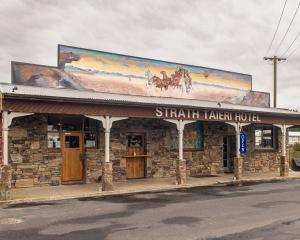In the first of a five-part series, the Otago Daily Times names the South’s top 20 inspiring people for 2022.
Zoi Sadowski-Synnott. Snowboarder
 Zoi Sadowski-Synnott shows off her spoils. PHOTO: GETTY IMAGES
Zoi Sadowski-Synnott shows off her spoils. PHOTO: GETTY IMAGES

Pioneer. Superstar. Inspiration. Athlete.
There are a few words that help describe this remarkable young woman from Wanaka — but you really only need one to sum up her impact in 2022.
Champion.
And not just any champion, either.
Zoi Sadowski-Synnott sailed into immortality in February when she became the first New Zealander to win gold at the Winter Olympics.
Kiwi athletes had competed in 15 previous Olympics without bringing home the top honour, Annelise Coberger’s silver the high point in 1992 before two 16-year-old prodigies — Sadowski-Synnott and the equally precocious Nico Porteous — claimed bronze at Pyeongchang in 2018.
Expectations for the talented New Zealand team heading to Beijing were high, and the kids certainly delivered.
Sadowski-Synnott went into the snowboard slopestyle as the reigning world champion and duly took the top spot after the first round of action down the slopestyle course.
Then it was heart-in-mouth time for the boarder’s legion of Otago fans as she stumbled on her second run, and after her 11 fellow competitors had completed their third runs, it was one shot for glory down the 650m course for Sadowski-Synnott.
And boy, did she deliver. Needing something special, she made a faultless run and landed a huge 1080 with her final trick to claim gold with a smashing score of 92.88.
"It was the best run of my life," she said.
"It's an indescribable feeling but I just knew that I had to put it down and I knew I was capable of it so it took everything in me to land that last jump."
A rather earthier quote was delivered on live television by her very proud father — he kind of summed up how we were all feeling.
Sadowski-Synnott created more history when she became the first New Zealander to win multiple medals at a Winter Olympics, adding silver in the big air to complete her personal set.
After a season in which she also claimed two X Games gold medals and a Dew Tour win, she was deservedly named Snow Sports NZ athlete of the year.
Just 21, this remarkable athlete is leading a generation of fearless Kiwi winter wonders.
— Hayden Meikle
Glyn Lewers Queenstown, Lakes Mayor
 New Queenstown Lakes Mayor Glyn Lewers wears the mayoral chains. PHOTO: SUPPLIED
New Queenstown Lakes Mayor Glyn Lewers wears the mayoral chains. PHOTO: SUPPLIED

Heads up.
When former Queenstown Lakes mayor Jim Boult announced in April he would not be seeking re-election after two terms wearing the mayoral chains, the conversation immediately turned to who would replace him.
In the end, six people entered the mayoralty race — one of the dirtiest in the district’s history — but it was one-term councillor Glyn Lewers, whose seat around the council table was confirmed in 2019 by a now infamous coin toss with fellow council candidate AJ Mason, who was elected.
Mr Lewers called heads. And heads it was.
The task ahead of the structural engineer is enormous.
Along with quickly bedding in his new council — five of the 11 elected members have no previous council experience — Mr Lewers must now also lead the region’s post-Covid recovery, while also restoring public faith in the Queenstown Lakes District Council.
Other major areas of focus will need to be three major government reforms (Three Waters, the Resource Management Act and the Local Government Act), a need to tackle housing affordability, economic diversification and infrastructure pressure, woefully slow progress on "shovel-ready" projects, crippling staff shortages and sustainable and regenerative tourism through the destination management plan — along with climate change, the controversial Lakeview-Taumata development, and Queenstown Airport’s master planning process.
As reported in the Otago Daily Times in September, it is critical the new mayor and council hit the ground running, and are capable of working together to lead all of the district’s communities to a stronger, more united future.
A failure to do so could be disastrous.
— Tracey Roxburgh
Kate Macdonald, Entrepreneur
 Kate Macdonald has successfully launched a wool jersey business called
Davaar and Co. PHOTO: SUPPLIED
Kate Macdonald has successfully launched a wool jersey business called
Davaar and Co. PHOTO: SUPPLIED

Young Southland woman Kate Macdonald is helping make wool cool again.
In February, Miss Macdonald launched Davaar and Co, taking wool from her family property Davaar Station, near Te Anau, and producing homespun-style woollen jerseys in a farm-to-fashion process with each step being done in New Zealand.
Davaar Station is an 1100ha sheep and beef property which has been farmed by the Macdonald family since 1915. Disheartened by the prices being received for the crossbred wool clip, Kate and her father James talked about what they could do with their own clip to add value to it.
Having grown up wearing her beloved homespun jerseys — and armed with a marketing degree — she decided to go ahead with a business venture. Since then, her jerseys have been flying out of the woolshed, snapped up by rural and urban dwellers alike.
As well as selling jerseys, Miss Macdonald is also selling the virtues of New Zealand’s most renewable and sustainable natural fibre, in an increasingly environmentally conscious world which is looking for all the attributes wool affords.
— Sally Rae
Penny Simmonds, MP
 Penny Simmonds grabs a cuppa. PHOTO: SUPPLIED
Penny Simmonds grabs a cuppa. PHOTO: SUPPLIED

Penny Simmonds, who was chief executive of the Southern Institute of Technology (SIT) for 23 years, has been a vocal critic of the mega-merger uniting the country’s polytechnics under one umbrella — Te Pukenga.
SIT’s Zero Fees scheme has for years drawn people to study in Invercargill, or at its other campuses, but 2023 will likely be its final year as Te Pukenga plans a "unified fee approach".
This not the only grounds on which National’s education associate spokeswoman has criticised the Government merger, which has scrambled to keep costs down as it unites 16 institutes of technology and polytechnics and 11 transitional industry training organisations.
The annual forecast deficit of Te Pukenga is $63 million, down from $110 million forecast earlier this year, and a $35 million 2023 budget cutback was announced in October.
A lack of ability to be regionally and locally responsive, cost cuts at institutions that are performing well, and the likelihood of staff cuts are also criticisms she has raised.
The pressure will be on for the organisation to prove itself as the country gears up for elections next year.
This could become a hot issue, with Simmonds stating she would like to axe Te Pukenga if a National government is elected.
— Fiona Ellis












